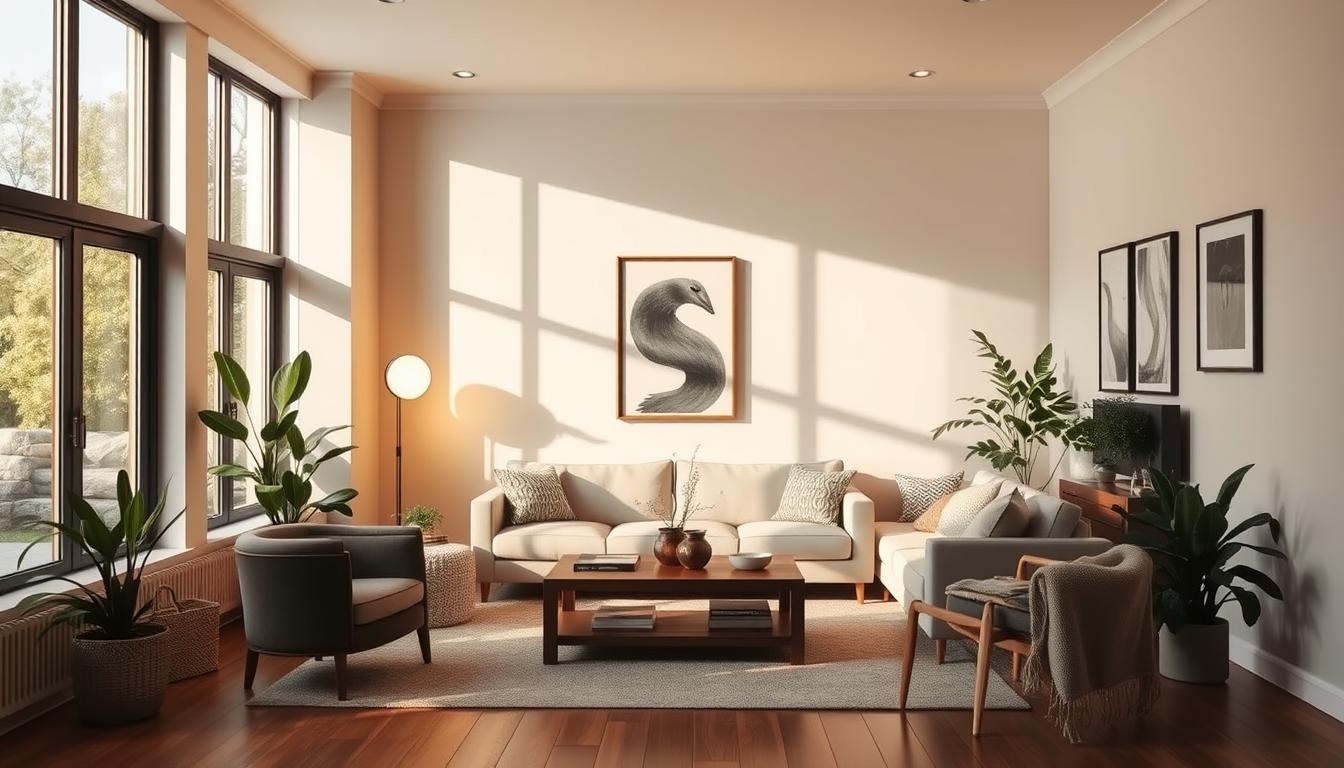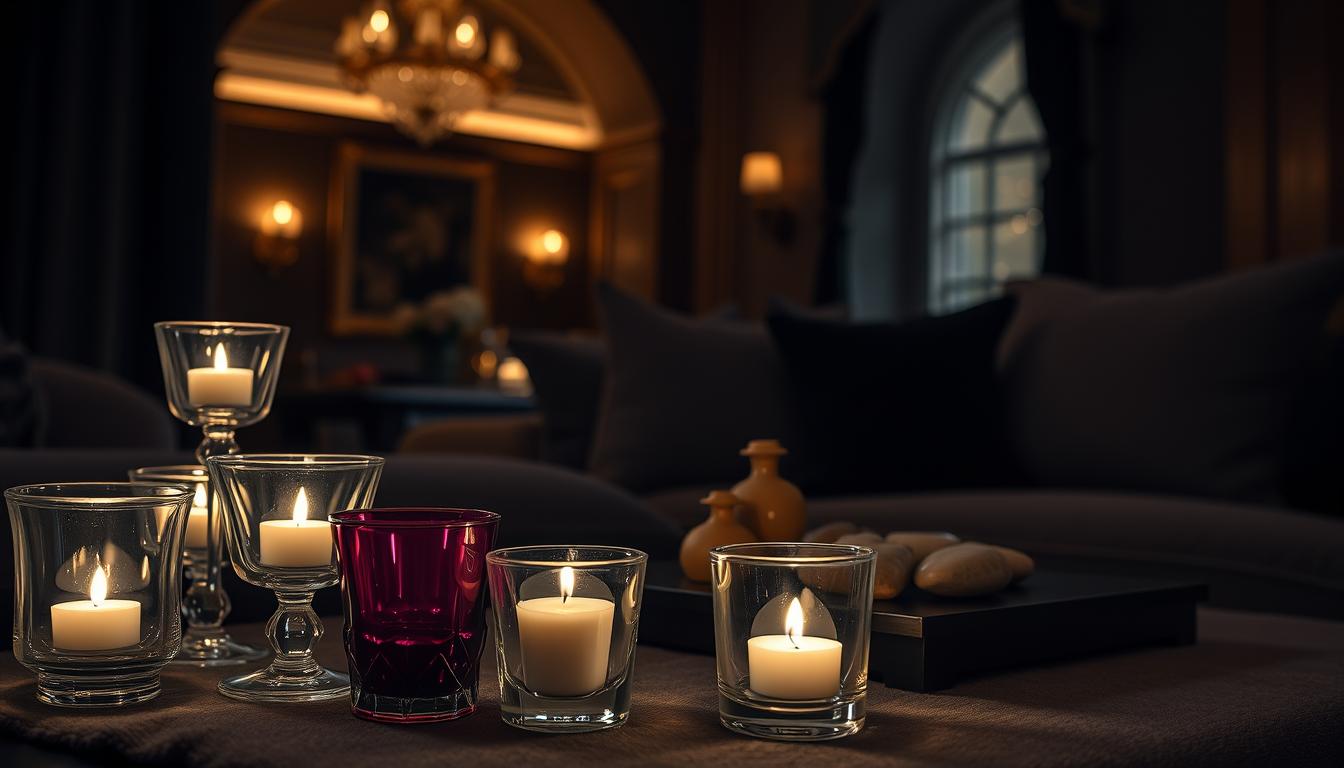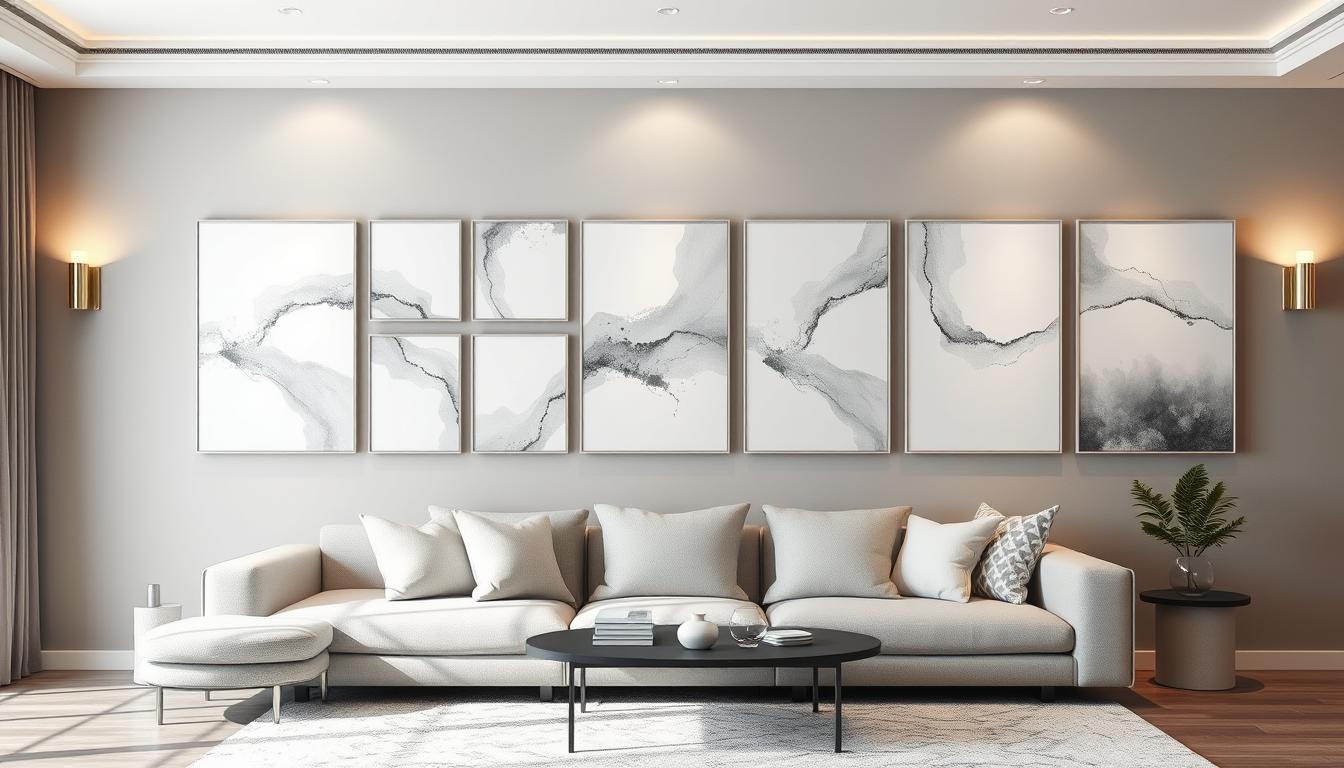A fresh coat of paint can change your living space a lot. It can make it look modern and inviting. With the right color schemes and techniques, you can make your home’s aesthetic appeal better. This will make your home feel welcoming.
Painting is a simple yet effective way to change your space’s look. Whether you want to update one room or your whole house, our tips will help. We’ll share various home painting ideas and give expert advice on picking the best colors and techniques.
Key Takeaways
- Discover the latest trends in interior painting
- Learn how to choose the perfect color palette for your space
- Understand the importance of preparation before painting
- Get tips on how to achieve a professional finish
- Explore different painting techniques to enhance your walls
Explore the Psychology of Color in Home Painting
Colors are key in setting the mood of our homes. They affect how our homes look and how we feel. When we pick colors for painting, we’re not just choosing what we like. We’re shaping the feel of our spaces.
How Color Affects Mood
Different colors can make us feel different ways. For example, blue can make us feel calm and peaceful, great for bedrooms. On the other hand, yellow can make us feel happy and energetic, perfect for kitchens and dining areas.
Color’s effect on mood is important when painting. Knowing how colors impact us helps us choose the right colors for our homes.
Choosing Colors for Different Rooms
Each room has its own purpose, and colors should match that. For example, a home office might use green for productivity and balance. Living rooms, where we relax, might use warmer tones like beige or terracotta for a cozy feel.
Think about the room’s purpose and the mood you want when picking colors. This careful choice can really improve your home’s feel.
Combining Colors Effectively
Using colors well is an art that can make your home look better. A common trick is the 60-30-10 rule: 60% of a main color, 30% of a secondary color, and 10% of an accent color. This mix creates a balanced and beautiful space.
Try out different color mixes to find the best for your home. The secret to great painting is not just picking your favorite colors. It’s about creating a look that makes your home feel better.
Popular Interior Paint Trends to Consider
Exploring interior design shows us how paint trends can change our homes. With so many choices, picking the right trend can be thrilling yet confusing.
Earthy Tones for a Cozy Vibe
Earthy tones are now popular for creating cozy homes. Colors like green, terracotta, and beige add warmth. They’re great for living rooms and bedrooms, making them feel relaxing.
To add earthy tones, mix them with natural materials like wood and stone. This mix brings a natural feel, making your space a calm escape.
Bright Colors for a Modern Touch
Bright colors are perfect for a modern look. Colors like cobalt blue, yellow, and red add energy. They’re great for accent walls, ceilings, or rooms for a bold statement.
When using bright colors, balance them with neutral items. A bright wall with neutral furniture creates a striking contrast, adding interest to your room.
Accent Walls and Their Impact
Accent walls are a big trend in design. They add a focal point with a bold or contrasting color. This creates a visual anchor, adding depth to your space.
Choosing the right color for an accent wall is key. Pick a color that complements or contrasts with the room’s decor. This thoughtful choice can make your space more engaging and dynamic.
Preparing Your Space for a Fresh Coat
Getting your space ready is key to a great painting job. We’ll show you how to clear the area, get the right tools, and protect your furniture. This way, you can avoid paint spills and stains.
Clearing the Area for Painting
To paint smoothly, remove furniture, curtains, and rugs. They can get in the way or get damaged. If you can’t move furniture, cover it with drop cloths or plastic sheets.
Also, take out outlet covers and switch plates. This stops paint from getting behind them.
Materials Needed for Preparation
You’ll need some important items to get ready for painting. These include:
- Drop cloths or tarps to protect your floors
- Masking tape for sharp edges and lines
- Paint trays and liners for easy cleanup
- Cleaning supplies to remove dirt and grime
- Sandpaper or a sanding block to smooth surfaces
Having these materials ready will make painting easier. It will also help you get professional-looking results.
Tips for Protecting Furniture
It’s important to protect your furniture from paint spills and stains. Here are some tips:
- Move furniture away from walls and cover it with drop cloths or plastic sheets.
- Remove any valuable or sensitive items from the room.
- Use masking tape to protect baseboards, trim, and moldings.
- Cover your floors with drop cloths or tarps to prevent paint spills.
By using these DIY painting tips, you’ll do a great job. Remember, preparation is the secret to professional-looking results.
Selecting the Right Paint for Your Home
Finding the right paint can change your home’s look. But, picking the right one needs careful thought. There are many paints, finishes, and environmental impacts to think about.
Types of Interior Paints
There are many types of interior paints. Latex paint is easy to use and dries fast. Oil-based paint gives a strong finish but takes longer to dry.
| Paint Type | Drying Time | Durability |
|---|---|---|
| Latex | 1-2 hours | Medium |
| Oil-Based | 24 hours | High |
Choosing Between Matte and Gloss Finish
The paint finish greatly affects your room’s look. A matte finish hides wall flaws well. A gloss finish is durable and easy to clean.
- Matte finish: Hides wall imperfections, less reflective.
- Gloss finish: Durable, easy to clean, more reflective.
Eco-Friendly Paint Options
If you care about the environment, eco-friendly paints are a good choice. These paints use natural ingredients and have fewer VOCs.
Think about color, finish, and paint type for your project. For example, a light color with matte finish can be calming. A bold color with gloss finish can be lively.
By looking at these factors, you can pick the best paint for your home. It will look great, last long, and be good for the planet.
Techniques to Enhance Your Painting Skills
To get a professional look, you need to learn different painting techniques. Whether you’re experienced or new, knowing the right methods is key. It can greatly improve your project’s finish.
Brush vs. Roller: Which to Use?
Deciding between a brush and a roller depends on your project’s needs. Brushes are best for trim work, cutting in, and detailed areas. On the other hand, rollers are great for covering big areas fast and evenly. For a smooth finish, pick a high-quality roller with the right nap length for your paint.
Creating Texture with Techniques
Adding texture to walls can make a room look better. You can use sponging, ragging, and stippling to get unique looks. Try out different tools and methods to find the perfect texture for your walls.
The Importance of Primer
Don’t skip the primer step. Primer helps paint stick better, covers stains, and gives a uniform look. It’s vital when painting over dark colors or bold patterns. Primer makes your paint job last longer and look better.
By learning these techniques and knowing when to use them, you can get a professional finish. Whether it’s one room or your whole house, the right techniques will make a big difference.
DIY vs. Professional: What’s Best for You?
Choosing between DIY painting and hiring a pro can be tough. Knowing the good and bad of each helps make your choice easier.
DIY painting has its perks. These include:
- Cost Savings: Painting yourself can cut down on labor costs.
- Personal Satisfaction: Doing it yourself can be very rewarding.
- Flexibility: You can work at your own pace and change things as you go.
Benefits of DIY Painting Projects
DIY painting saves money and gives you a sense of accomplishment. But, it takes a lot of time and effort. Think if you have the skills and tools to get the job done right.
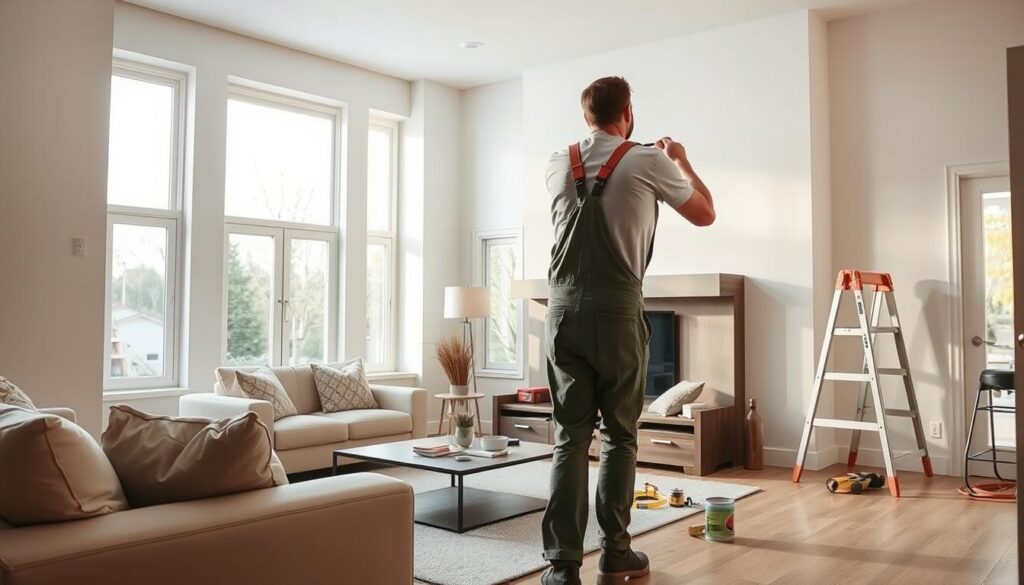
When to Hire a Professional Painter
There are times when hiring a pro is the smart choice. This is true for:
- Complex Projects: Jobs with lots of details or high ceilings are best left to the experts.
- Lack of Time: If you’re busy, hiring pros saves you time and stress.
- Desire for Perfection: Pros have the skills to give you top-notch results.
Choosing professional painting services means your job will be done well and fast. You’ll get a finish that lasts.
Cost Considerations
Cost is a big factor in your decision. DIY can save on labor, but think about material, equipment, and time costs. Pros give a full quote that covers everything.
In short, your choice depends on your project, budget, and what you prefer. Weighing the pros and cons helps you decide what’s best for you.
Seasonal Painting Ideas to Refresh Your Space
Changing your home’s paint to match the season can make it feel new again. As seasons change, a fresh paint job can update your home’s look. We’ll look at how to use seasonal colors and themes in your painting.
Spring: Pastel and Bright Hues
Spring is a great time for soft, pastel colors in your home. Think pale pink, baby blue, and mint green for a calm feel. Pastel colors are soothing and contrast nicely with winter’s dark tones.
For a lively touch, add bright colors like yellow and orange to your spring palette. These colors bring energy and warmth. Interior design experts say, “Bright colors in small doses can highlight any room beautifully.”
Summer: Bold and Vibrant Choices
Summer is the perfect time for bold, vibrant colors. Try coral, turquoise, and sunny yellow for a lively feel. These colors are great for a fun, relaxed vibe in your home.
When using bold colors, pair them with neutral shades to avoid too much. A designer advises, “Bold colors can add personality, but use them wisely for balance.”
Fall: Warm and Earthy Shades
With fall, warm and earthy tones take center stage. Think terracotta, sienna, and golden brown for coziness. These colors remind us of the season’s leaves and make your home welcoming.
To really capture the fall spirit, mix warm colors with natural textures and elements. Think wooden accents, woven baskets, and autumn leaves.
“The key to a successful seasonal paint job is to create a cohesive look that ties in with the natural surroundings and the overall aesthetic of your home.”
Maintaining Your Freshly Painted Walls
To keep your painting project looking great, you need to take care of it. After you finish painting, it’s important to keep your walls in good shape. Here are some interior painting tips to help you do just that.
Cleaning Tips for Painted Surfaces
Regular cleaning helps stop dirt and grime from building up. Use a soft, damp cloth to clean your walls. For tough stains, a mild soap solution works well. But, avoid harsh chemicals or abrasive cleaners, as they can harm the paint.
- Gentle Cleaning: Use a soft cloth and mild soap solution.
- Avoid Harsh Chemicals: Never use abrasive cleaners or strong detergents.
- Dry Walls: After cleaning, dry the walls thoroughly to prevent water spots.
For really tough stains, you might need a special cleaning product. Always test a small area first to make sure it won’t damage the paint.
| Cleaning Method | Effectiveness | Safety |
|---|---|---|
| Soft Cloth & Mild Soap | High | Safe |
| Specialized Cleaning Products | Medium | Conditional |
| Harsh Chemicals | Low | Dangerous |
Touch-Up Techniques for Longevity
Accidents can happen, and walls can get damaged. Knowing how to touch up your paint job is important. Here are some interior painting tips for touch-ups.
First, find the damaged area and clean it gently. If the damage is small, use a small brush to touch up the area with matching paint. For bigger damage, you might need to repaint the whole wall for a seamless look.
“The key to a successful touch-up is using the right paint and applying it correctly. With a little practice, you can make your walls look like new again.”
To get a perfect match, keep some leftover paint from your original project. Label the paint cans with the room and wall they were used on. This way, you can easily find the right color when needed.
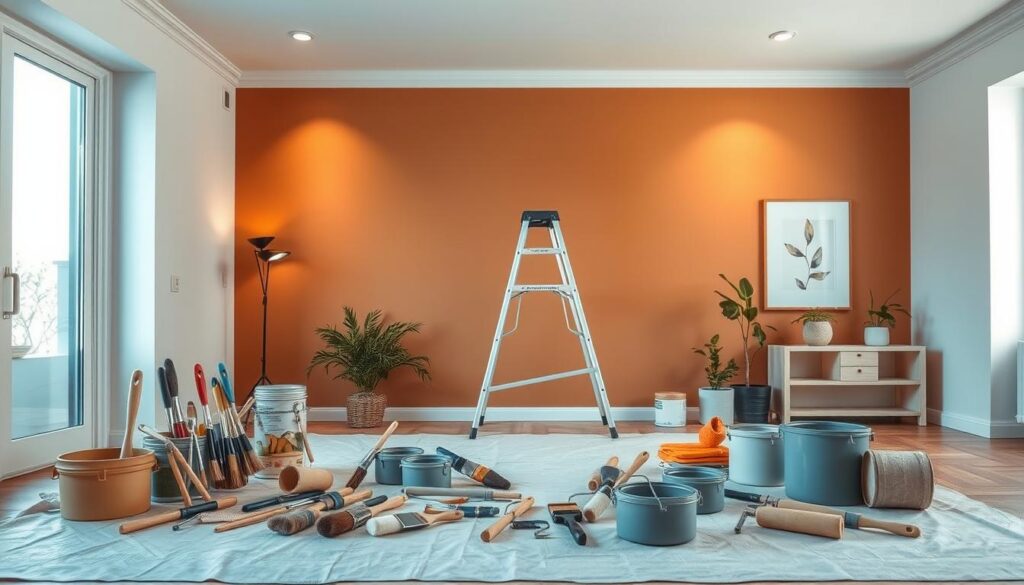
By following these interior painting tips, you can keep your walls looking fresh and vibrant for years. Regular maintenance and knowing how to touch up damaged areas are key to a long-lasting paint job.
Conclusion: Transform Your Space with Color
A fresh coat of paint can really make your home look better. It’s a great project for your next home makeover.
Choosing the Right Colors
Choosing wall colors can be tough. But, by thinking about color psychology and trends, you can pick the best colors for your space.
We’ve talked about how to improve your painting skills. This includes getting your space ready and deciding if you should paint yourself or hire a pro. Now, it’s time to start your painting project.
Starting Your Painting Journey
With the knowledge and inspiration from our guide, you’re ready to start your home makeover. You’ll turn your space into a beautiful and welcoming home.

